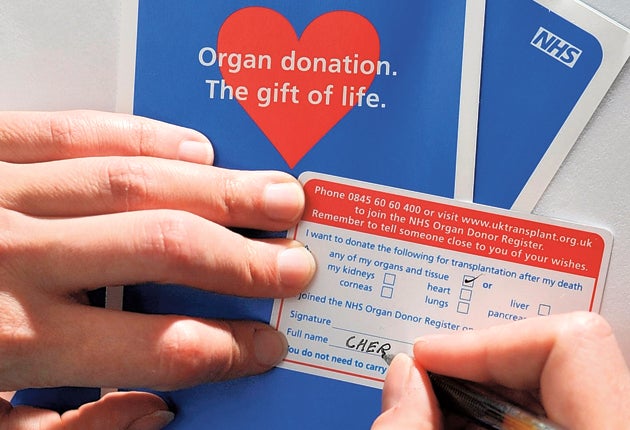Inquiry into 800,000 organ donor data errors
Investigation to focus on transfer of records from DVLA to the NHS

Your support helps us to tell the story
From reproductive rights to climate change to Big Tech, The Independent is on the ground when the story is developing. Whether it's investigating the financials of Elon Musk's pro-Trump PAC or producing our latest documentary, 'The A Word', which shines a light on the American women fighting for reproductive rights, we know how important it is to parse out the facts from the messaging.
At such a critical moment in US history, we need reporters on the ground. Your donation allows us to keep sending journalists to speak to both sides of the story.
The Independent is trusted by Americans across the entire political spectrum. And unlike many other quality news outlets, we choose not to lock Americans out of our reporting and analysis with paywalls. We believe quality journalism should be available to everyone, paid for by those who can afford it.
Your support makes all the difference.An inquiry was announced yesterday into how around 800,000 people on the organ donor register had their wishes wrongly recorded.
Andy Burnham, the health secretary, said it was a matter of "deep regret" that as a result of the error 20 families had allowed organs to be taken from deceased relatives after being misinformed about what consent had previously been given.
Mr Burnham said he had asked NHS Blood and Transplant to contact all the affected families and had appointed Professor Sir Gordon Duff, Chairman of the Committee on the Safety of Medicines, to lead a review into how the errors occurred.
It is believed they happened when the Driver and Vehicle Licensing Authority in Swansea, which in the past collected details of drivers' wishes about organ donation, transferred its records to NHS Blood and Transplant which now runs the organ donor register. About one in four (27 per cent) of the adult population has registered to donate organs after death.
Mr Burnham said: "I want to assure the millions of people on the organ donor register that they can have full confidence that only their accurate information will be discussed with their families, and that their wishes will be respected. This has clearly not happened in a small number of cases in the past, and I deeply regret the distress caused to the families. In all cases, donation was discussed with family members before decisions were made. It is important that those who wish to donate tell their families of their wishes."
Donors who join the register give permission for any of their organs to be used or can impose restrictions specifying which organs may not be used. Consent is most often withheld for the eyes or for bodies to be used in medical research.
The issue of consent has been highly sensitive since the Alder Hey scandal a decade ago when organs were taken from the bodies of dead babies for research without the consent of their parents, sparking an inquiry and a change in the law. At least 100,000 organs were taken without proper procedures over decades and thousands were returned to relatives so they could lay to rest the remains of loved ones. The latest error is not on that scale but, in the midst of an election campaign, the Government has acted immediately.
Dr Evan Harris, Liberal Democrat science spokesman and chairman of the Parliamentary Kidney Group, said the revelation of the blunder "misses the real problem" of patients awaiting transplant being wrongly denied the organs they needed.
"The few cases that have emerged where relatives have approved donation beyond the donor's wishes are exceeded by the occasions where relatives have refused donation in the presence of a registered willingness from the donor, and dwarfed by the number of refusals by relatives of donation where the donor would have wanted to donate but was not on the register.
"In the cases that have emerged at least the end result is the saving of lives, whereas when relatives refuse when donors would be willing, the result is that recipients die while waiting."
Join our commenting forum
Join thought-provoking conversations, follow other Independent readers and see their replies
Comments